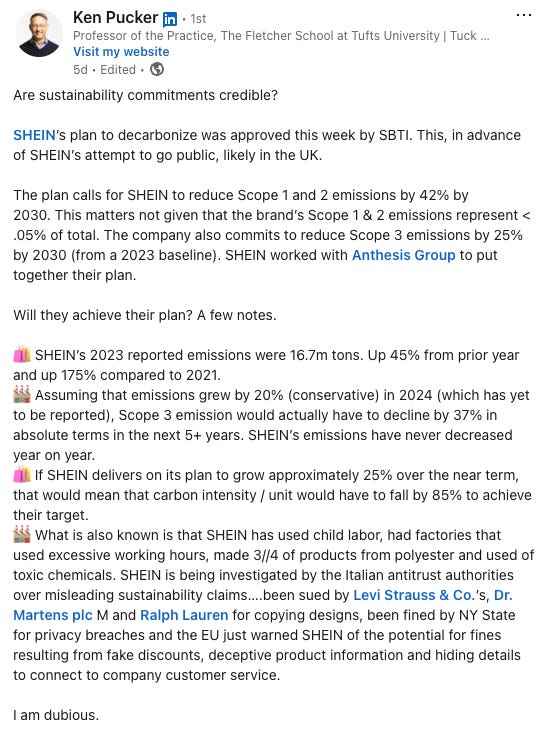La Impact Weekly: Week of May 26th 2025
SHEIN gets its climate targets approved by SBTi, kangaroo leather, and as always, some amazing SME spotlights. 🫒
Featured Story: ASICS ends kangaroo skin usage.
La Backdrop
I remember my dad's soccer cleats, and I swear I didn’t know they were made of kangaroo leather. But they were, because "k-leather" has always been the “gold standard.” Not everyone agrees with that. The 2020 "Kangaroos Are Not Shoes" campaign went hard after the big brands with protests, lawsuits, and boycotts. The dominoes fell pretty fast: Diadora started in 2019, then Puma and Nike in March 2023, New Balance in September, and finally Adidas and ASICS this past May. Mizuno's the last holdout still making kangaroo leather cleats.
Here's where it gets messy: Australia actually culls kangaroos under government quotas to "manage populations” as they have recently experienced rapid growth. Quotas allow for 5Mn kills annually out of a total of 50Mn kangaroos, with 6Mn dying from the drought and starvation. Activists say 300k-500k baby joeys get orphaned, and that kangaroos actually keep the ecosystem healthy. But wildlife experts argue regulated commercial hunting is way better than farmers just shooting them as pests. The real issue? Natural predators (like the dingo) of the kangaroo are mostly gone, so kangaroo populations exploded. Some claim that without management, they'd face mass starvation and wreck the ecosystem.
Los Details
ASICS just announced they're ditching kangaroo leather by end of 2025, right after Adidas made the same call days earlier. They say they've got high-performance alternatives now, so there's no excuse to keep using what activists call “an inhumane trade.”
How about others? Nike built proprietary synthetics that match k-leather performance. Puma rolled out "k-better" with 20% recycled content. Others went wild with lab-grown materials (mushroom leather, pineapple fiber, you name it). These alternatives actually have perks beyond the animal welfare angle: consistent quality, no nasty tanning chemicals, and you can engineer them for specific needs.
But here's the catch - most synthetic leather is petroleum-based. So we're trading one environmental problem for another. The bio-based options sound great until you realize they need tons of energy and chemicals to process. Plus some synthetics just don't breathe or last like real leather, which means more waste when they fall apart faster.
Mi Take
This kangaroo controversy perfectly shows how sustainability gets messy: fixing one problem has unintended consequences.
It is clear that Australia needs better policies that handle wildlife management properly. They need to deal with the issue with joey orphaning, and further study the impact of kangaroos in the environment. Ecosystems are fickle and complex.
The animal lover in me is glad that these changes are happening. Kangaroo leather just feels wrong. But, in the end, I don't want animals to suffer, and it's unclear what the best way to do that is.
So what do you think? Kangaroo culling: necessary evil or just evil?
Maybe this picture will change your mind.

Brand & Industry Moves
🫒 Pact launches Circle resale platform. The organic clothing brand unveiled its peer-to-peer resale marketplace where customers can buy and sell secondhand Pact items, offering sellers 110% of the sale price in store credit or 80% in cash. The platform partners with Treet to manage the experience, including reviewing all posts, facilitating shipments, and handling payments while promoting circular fashion practices. Read more.
🫒 Passenger Clothing adopts NetPlus recycled fishing nets. The UK outdoor brand integrated NetPlus material into its boardshorts, made from recycled fishing nets that are fully traceable and post-consumer recycled. Through Bureo's recycling program, discarded nets are sourced directly from fishing communities before they can damage marine ecosystems, with the material mirroring performance to virgin plastics. Read more.
🫒 Pangaia launches plant-based activewear collection. The materials science company unveiled its most advanced plant-based activewear to date, the "365 Seamless Activewear" collection made with 100% bio-based Evo Nylon and Hyosung’s regen Bio Max elastane composed of 98% renewable resources. Pangaia is the first brand globally to incorporate regen Bio Max elastane into commercial activewear, delivering 27% lower carbon footprint and 82% less ozone depletion than conventional spandex. Read more.
Italian fashion brands sign worker exploitation action plan. Legal authorities, fashion industry bodies, and trade unions signed a non-binding accord to fight supply chain abuse after prosecutors found widespread manufacturing methods that risk lives. The plan creates a database tracking suppliers and workers, with required updates every six months on compliance. Recent investigations put Valentino units under judicial control, while earlier probes targeted Dior and Armani for workshops where underpaid workers made luxury bags for a fraction of retail prices. Italy handles half the world's luxury fashion production, making this initiative significant for global supply chain transparency. Read more.
Shein finalizes science-based targets approval. The Science Based Targets initiative validated Shein's net-zero greenhouse gas emissions target by 2050, with plans to reduce absolute Scope 1 and 2 emissions by 42% and Scope 3 emissions by 25% by 2030. Critics question whether the 25% Scope 3 reduction target is ambitious enough, given that Shein's emissions increased ~175% between 2021 and 2023 and that 99% of their emissions live in Scope 3, making the Scope 1 and 2 reductions largely symbolic. This comes as the fast fashion giant reportedly shifted focus to a Hong Kong IPO after London plans stalled due to limited communication from China's Securities Regulatory Commission, marking its third attempt at going public. Plenty of discussions have been had about this, including Ken Pucker’s LinkedIn Post and Brittany Sierra’s Week/End. Mi quick take: This, of course, would enable greenwashing, giving them free reign to claim they are on a path to being sustainable (which we all know directly contradicts their business model). Is the plan to make the commitment and back out like 239+ companies have thus far? Will having this commitment change their business model? Will they be able to reach it? I know what my bet will be. Read more.
Zalando joins Fair Wear to strengthen supply chain standards. The German online fashion retailer became a member of Fair Wear, focusing on improving working conditions within its own-brand production while encouraging other brands on its platform to enhance their human rights due diligence practices. The partnership holds Zalando accountable for performance and achievements including labor standards monitoring, factory audits, and worker complaint systems across its private label supply chain. Read more.
Fashion Tech & Sustainability Innovation Updates
RE&UP becomes “first brand in the world to achieve C2C Certified® Circularity for all products.” The fiber manufacturer achieved Cradle to Cradle Certified Product Circularity across all products, with Next-Gen Recycled Cotton earning Platinum certification and Textile-to-Textile Recycled Polyester Chips receiving Silver certification. The achievement sets a precedent for what fiber innovation can look like in a circular economy, demonstrating full-system readiness from sourcing to end-of-life. Read more.
HKRITA and Epson develop silk-like recycled fiber. The Hong Kong Research Institute partnered with Seiko Epson to create regenerated cellulose fiber with a silk-like sheen from waste cotton fabric, combining Epson's Dry Fibre Technology with HKRITA's fiber-dissolving technology. The regenerated fiber is expected to have both smooth, silky appearance and cotton strength, targeting high-end applications like scarves, neckties, and suit linings. Read more.
Modern Meadow unveils it bio-leather, Innovera. The bio-design company will unveil its next-generation material, newly branded as Innovera (formerly Bio-Vera), at Global Fashion Summit in Copenhagen this coming week. Crafted using plant-based proteins, biopolymers and recycled rubber, Innovera achieves over 80% renewable carbon content and is twice as strong as traditional leather while being completely animal-free. Read more.
Veteran's Carbon Holdings pledges $1.1Bn to farmers. The North Dakota-based company announced it will distribute direct payments over nine years to US farmers and landowners who bury organic carbon in agricultural soil. The Carbon Development Program covers 2.5Mn acres and is projected to capture 41Mn tons of CO2, with 55% of carbon credit revenue returning directly to farmers. Read more.
Upstream News
Indonesian garment workers protest at Nike headquarters. Three Indonesian factory workers traveled to Oregon to protest outside Nike's Beaverton headquarters, demanding the company address wage theft and abusive conditions in its supply chain that they say worsened during COVID-19. The workers, supported by the Asia Floor Wage Alliance, represent thousands of women throughout Asia and plan to continue their US tour through New York, Philadelphia, and Washington D.C. Read more.
Bangladesh factories still owe Eid bonuses. With Eid-ul-Adha approaching, over 1,200 garment factories in Bangladesh have yet to pay workers their festival bonuses, raising concerns about ongoing financial pressures in the industry. The delay affects thousands of workers who rely on these payments to celebrate with their families and support their communities during the important religious holiday. Read more.
Regulatory and Policy Shifts
California revises plastic packaging EPR regulations. CalRecycle released a revised draft of its SB 54 plastic packaging extended producer responsibility regulations, with stakeholders given until June 3 to submit feedback. The landmark law requires all single-use plastics in California to be recyclable or compostable by 2032, with producers responsible for $5 billion in funding over 10 years to support the transition. Read more.
Shein commits $15Mn to compliance amid EU probe. The fast fashion retailer announced it will conduct 2.5Mn product safety and quality tests in 2025, up from 2Mn last year, and spend $15Mn on compliance initiatives. The move follows formal warnings from the European Commission and Consumer Protection Cooperation network over alleged violations of EU consumer law, giving Shein one month to propose corrective measures. Read more.
EU nearly on track for 2030 climate goals. The European Commission announced the EU is on course to reduce net greenhouse gas emissions by 54% by 2030 compared to 1990 levels, just shy of its legally-binding 55% target. The assessment credited strong progress in the energy sector, with renewable sources covering 24% of EU energy consumption in 2023, though agriculture and transport sectors continue to lag behind. Read more.
Know someone who would dig this post? Spread the olives 🫒 and share.
Want this delivered weekly? Subscribe to La Purpose Brand. 🫒






